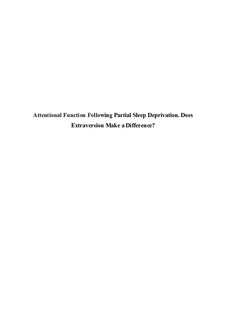| dc.description.abstract | Sleep is important for normal healthy functioning, and sleeping less than recommended is associated with various negative consequences. Obtaining less-than-sufficient sleep is common in various populations, and thus considered important to investigate. The negative effects of sleep loss are especially pronounced for attention. Inter-individual differences in the vulnerability to sleep loss is recognized in the literature. Previous research has documented that the declines in attentional function is more pronounced for extroverts than for introverts. Objectives: The present study explored how participants’ attention was affected by sleeping two hours less than their habitual sleep length for three consecutive nights in their natural environment. Further, it investigated the contributing effects of the participants’ scores on the personality trait extraversion. Method: A within group multiple baseline experimental design was applied. A sample of healthy, young adults (n = 30, aged 19 to 35) underwent a procedure of partial sleep deprivation based on their habitual sleep lengths. Habitual sleep lengths were calculated based on one week of normal sleep patterns recorded by an actigraph, the Actiwatch Spectrum Pro ©. Participants’ attentional performance was measured by the use of CCPT-3 on five occasions in total. Personality was measured using the NEO-PI-3 at baseline. Statistical analyses were performed using raw scores of attentional performance in speed and accuracy from baseline, and comparing these to raw scores of speed and accuracy obtained after three days of partial sleep deprivation. Results: Statistical significant changes in speed and accuracy of small to moderate effects sizes were recorded after partial sleep deprivation compared to rested baseline. Participants’ reaction times were shorter after the sleep deprivation. Their responses were more prone to errors, suggesting a speed-accuracy effect. Individual differences in decrements in attention were not related to participants’ scores on extraversion. Conclusions: Healthy young adults exhibit more impulsive responding when partially sleep deprived, but their attentional impairment cannot be matched with deficits manifested in true attentional disorders. Limitations in the present study and directions for future research is discussed. | nb_NO |
